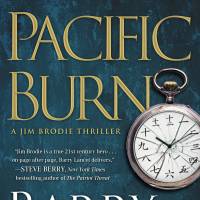Who's killing off members of Kyoto's artistic Nobuki family, and why? First a son is murdered on a visit to Napa, California; then a sniper nearly succeeds in gunning down the father, a famous artist. After the younger son and his fiance are thrown off a precipice in Kyoto, the sole daughter — an anti-nuclear activist — and her attorney husband vanish upon their arrival at Narita airport.
Pacific Burn, by Barry Lancet
368 pages
Simon & Schuster, Fiction.
When California police require help on matters Japanese, they turn to Jim Brodie. Raised in Tokyo and fluent in the language, Brodie leads a double life, dealing in Japanese antiques and objets d'art, which he sells at his shop in San Francisco. He also inherited a Tokyo security agency from his late father and serves as a corporate figurehead for the Japanese staff.
"Pacific Burn" marks Brodie's third appearance, and like Barry Lancet's two previous works, the American finds himself contending with yet another devious opponent — known as the Steam Walker — who's so ruthless even hardened yakuza fear him.
Brodie stands out as an almost normal person who happens to be adept at Asian martial arts, but is fortified with an excess of courage. Such manly qualities endear Rie Hoshino, the Japanese policewomen Brodie encountered in "Tokyo Kill," the previous work. But the couple's romantic interludes are repeatedly thwarted, once by a close shave with fugu poison and subsequently in a chilling showdown with the shadowy antagonist that leaves Brodie gasping from multiple bruises and contusions.
Certainly Lancet's best effort to date, "Pacific Burn" demonstrates that like its bilingual protagonist, the author's been adding more tricks of the trade to his repertoire.


















With your current subscription plan you can comment on stories. However, before writing your first comment, please create a display name in the Profile section of your subscriber account page.